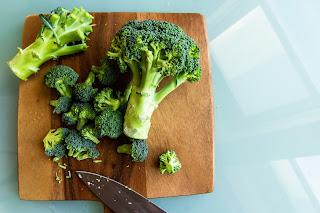14 Amazing Food categories for a Healthier Heart
Eating healthily is vital for heart health. Add the following foods to your meals to improve heart health.
1. Leafy green vegetables
Leafy green vegetables are rich in vitamins, minerals, and antioxidants which may help lower the risk of cardiovascular disease (cholesterol, blood pressure, and inflammation).
Broccoli
It contains vitamins C and E which have antioxidant effects. Broccoli also contains minerals, like potassium which helps maintain a healthy nervous system, magnesium and calcium, which regulate blood pressure. Also, vitamin B6 in broccoli reduces the risk of heart attack.
Kale
It contains essential heart-healthy nutrients like nitrates which improve blood flow hence reducing blood pressure.
Spinach
It contains potassium which helps improve blood pressure.
Swiss chard
It contains potassium and magnesium. These minerals help control blood pressure. It also contains heart-healthy fiber, vitamin A and antioxidants (lutein and Zeaxanthin).
2. Fresh herbs
Not only do these herbs flavor foods, but they are tasty and are a good choice for your heart. Examples include thyme, rosemary, oregano, sage.
 |
| Rosemary |
 |
| Thyme |
 |
| Oregano |
3. Fruits
Fruits contain antioxidants, minerals, and phytochemicals that help protect your heart. Examples include:
Oranges
Oranges are sweet and juicy and, they contain cholesterol-fighting fiber pectin and potassium, which helps in controlling blood pressure.
Cherries
Cherries and, cherry juice are good for your heart. They all contain antioxidants called anthocyanins. They help protect blood vessels.
Blueberries
Blueberries contain antioxidants (anthocyanins) which help protect blood vessels and, these antioxidants give the berries their dark blue color. Blueberries contain fiber and many other nutrients. You can add fresh or dried blueberries to yogurt or cereal and enjoy.
Tomatoes
These contain antioxidants (lycopene) which may help lower LDL levels and blood pressure, vitamins B and E and, other antioxidants known as flavonoids which may boost your health.
Red apples
These contain soluble fiber, which helps lower blood cholesterol levels.
Avocados
Most of the fat in avocados is monounsaturated, which may help lower LDL cholesterol. Avocados contain lots of vitamins, minerals, antioxidants, and dietary fiber, which also help to keep your heart healthier.
4. Fatty fish
Fish like salmon, tuna, mackerel, herring, and trout contain omega−3s, which are healthy fats that may lessen the risk of heart rhythm disorders and lower blood pressure. You can have at least two servings of fatty fish a week.
5. Olive oil
Olive oil is a healthy fat made from crushed olives and, it contains heart-healthy antioxidants. These may protect your blood vessels. If olive oil replaces saturated fat like butter, it can help lower cholesterol levels.
6. Low-fat yogurt
Yogurt contains high amounts of calcium and potassium. Low-fat yogurt helps boost calcium levels and minimize fat in your body.
7. Legume foods
Black beans
Small, tender black beans contain heart-healthy nutrients. Folate, antioxidants, and magnesium can help in lowering blood pressure. Their fiber helps in regulating cholesterol and blood sugar levels.
Peas
Green peas minerals like magnesium, potassium, and calcium which improve heart health. Diets that contain high amounts of these nutrients may help prevent high blood pressure.
Soybeans
A cup of soybeans contains 8 grams of heart-healthy fiber. Soy protein can also help lower cholesterol levels.
8. Foods that contain sterols
Some kinds of soy milk, almond milk, margarine and, orange juices have cholesterol-fighting sterols and stanols. The plant extracts block bad cholesterol from reaching your gut. They can lower LDL levels by 10% without messing up with good cholesterol.
9. Red wine
Taking a little red wine could be a heart-healthy choice for those who drink alcohol. The two antioxidants in red wine (resveratrol and catechins) may protect artery walls. Alcohol may also boost HDL, the good cholesterol.
Too much alcohol badly affects the heart. Take a little a day (one bottle for women and not more than two for men). Alcohol may severely affect people taking aspirin and other medications.
10. Nuts
Walnuts
Eating a small handful of walnuts a day may lower your cholesterol and, it may also protect against inflammation in your heart′s arteries. Walnuts contain omega−3s, healthy fats (monounsaturated fats), plant sterols, and fiber. You may replace bad fats like those in cookies and chips with walnut oil.
Almonds
Eating silvered almonds alongside vegetables, fish, skinless chicken and, desserts is delicious. Almonds contain plant sterols, fiber, and heart-healthy fats, which may help lower bad cholesterol (LDL).
11. Whole grain foods
Barley
You can replace this nutritious whole grain with rice. Barley contains fiber that helps in lowering cholesterol levels and, may also lower blood sugar levels.
Oatmeal
A warm bowl of oatmeal fills you up for hours and, this prevents you from eating a lot of snacks throughout the day and helps keep your blood sugar levels stable over time. People with diabetes can enjoy this meal too. Oats′ fiber can help lower bad cholesterol (LDL).
 |
12. Seeds
Flaxseed
It is a shiny, honey-colored seed that contains fiber, phytochemicals (lignans), and omega−3 fatty acids, which improve your heart health. Grind flaxseed and add it to cereal, baked goods, or yogurt and enjoy.
Chia seeds
They contain omega−3 fatty acids, antioxidants, minerals (iron and calcium), and fiber. Omega−3 fatty acids help raise HDL cholesterol (good cholesterol) that protects against heart attack and stroke.
13. Sweet Potatoes
These contain fiber, vitamin A and lycopene. Sweet potatoes also have a lower glycemic index than white potatoes meaning when eaten, they'll not cause a quick spike in blood sugar. Sprinkle cinnamon and lime juice during preparation to boost their natural sweetness instead of sugary toppings.
14. Dark chocolate
Not only does dark chocolate taste delicious, but it also contains heart-healthy flavonoids. These compounds help in reducing inflammation and lower the risk of heart disease. Eaten in moderation, dark chocolate (not over-sweetened milk chocolate) can be good for you.




















Let me try them, thanks for the tips
ReplyDeleteYou're welcome please
Delete